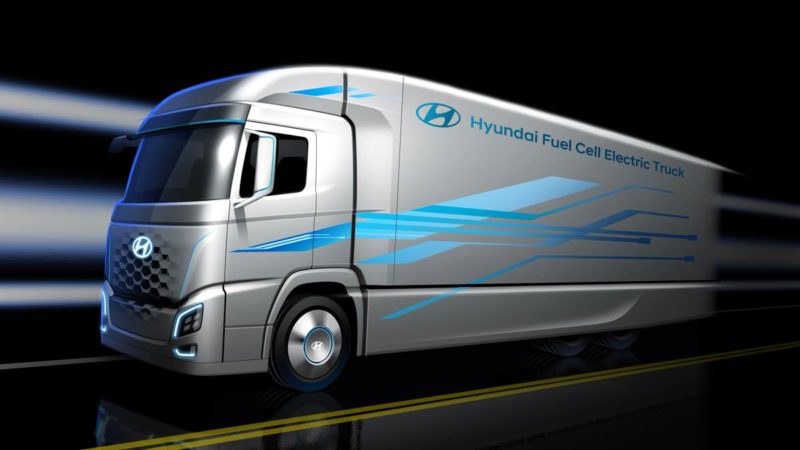A fleet of 1,000 hydrogen fuel cell electric trucks forms the central part of a memorandum inked last week between South Korean carmaker Hyundai and Swiss renewable resource company H2 Energy.
For five years starting from 2019, the fleet of 18 ton (16.32 tonne) fuel cell trucks will lead the vanguard of the commercialisation of zero emission trucks as they are provided to the hydrogen company in accordance with European regulations.
Following on from Hyundai’s Tucson Fuel Cell which became the world’s first mass-produced FCEV in 2013, and the release of the NEXO FCEV in 2018, the agreement to provide the fuel cell electric trucks underlines Hyundai’s efforts to expand their exposure into the zero emissions commercial vehicle market.
We first saw Hyundai’s fuel cell electric truck earlier this month, when the South Korean carmaker released an image of the aerodynamically designed truck with fuel cell powertrain in the lead up to IAA IAA Commercial Vehicles 2018.
Featuring a two-panel parallel hydrogen cell system amounting to 190kW output, the FCEV trucks, being developed by Hyundai are expected to deliver 400km range from full.
8 large hydrogen tanks that can be refueled in as little as 7 minutes sitting between the cabin and the rigid body of the truck will power the fuel cell stack.
Signing the memorandum (which also includes a reliable supply chain for renewable hydrogen) at IAA Commercial Vehicles 2018, head of Hyundai’s commercial vehicles division In Cheol Lee said that Hyundai’s ambition to commercialise the fuel cell electric truck is just the start.
“We will continue to seek opportunities for expanding into other markets by carefully monitoring multiple factors such as fueling infrastructure and governmental policies,” he says.
Upon receiving the FCEV truck fleet, H2 Energy will make them available to Swiss customers starting with members of the Swiss H2 Association.
Amongst the association’s members are hydrogen refueling station operators, retailers and other H2 customers whose interests lie strongly in eco-friendly logistics.
“A sustainable hydrogen economy needs a designated ecosystem for hydrogen. This is why our collaboration between Hyundai Motor, H2 Energy, the Swiss H2 Association, and Key electricity producers in Switzerland is strategic and makes a lot of sense,” H2 Energy’s chairmanRolf Huber said at the signing.
Fuel cell electric trucks will also become a more common sight in America, where up to 800 FCEV trucks made by Nikola have been ordered by the company that makes the all-American beer Budweiser.
Anheuser-Busch however will not buy the Nikola-made FCEV trucks, but lease them for around US90c per mile.

Bridie Schmidt is associate editor for The Driven, sister site of Renew Economy. She has been writing about electric vehicles since 2018, and has a keen interest in the role that zero-emissions transport has to play in sustainability. She has participated in podcasts such as Download This Show with Marc Fennell and Shirtloads of Science with Karl Kruszelnicki and is co-organiser of the Northern Rivers Electric Vehicle Forum. Bridie also owns a Tesla Model Y and has it available for hire on evee.com.au.

